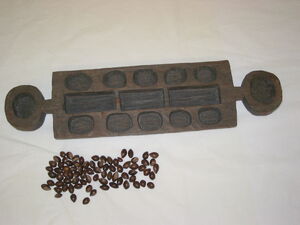Mancala board of Arguni → German, Portuguese.

Board and Counters
Adolf Hahn collected during the so-called Frobenius expedition in 1937/1938 a mancala board on the island of Arguni off the coast of western New Guinea (today: West Papua, Indonesia). It is a simple wooden board with two rows of five round pits, three large square-shaped holes in the middle and a round store hole for captured counters at each end. The board has a length of 60 cm and a maximum width of 16 cm. The counters used in the game are seeds of an undetermined plant species.
The field notes, which may have included the rules of the game, were destroyed in an air raid in World War II. The board is today in the Frobenius collection of the Museum der Weltkulturen (i.e. "Museum of World Cultures") in Frankfurt, Germany. The inventory number of the board is N.S. 31750.
Arguni is a small island in the McCluer Gulf. It is inhabited by the Arguni people. Only 150 people still speak their Malayo-Polynesian language. As the Arguni came from the Moluccas, their culture shares much with those of other Indonesian people, but is not related to the Papua. The Arguni produced iron and had porcelain from China and even Merovingian glass pearls, which reached them through ancient trade routes including the Silk Road. Their island belonged to a Sultanate which later served Indonesia to legitimate their occupation of western New Guinea.
External Links
- Arguni language report
- Museum der Weltkulturen, Frankfurt (Germany)
- Website promoting the liberation of West Papua
Copyright
Adapted from the Wikinfo article, "Mancala board of Arguni" http://www.wikinfo.org/index.php/Mancala_board_of_Arguni, used under the GNU Free Documentation License.